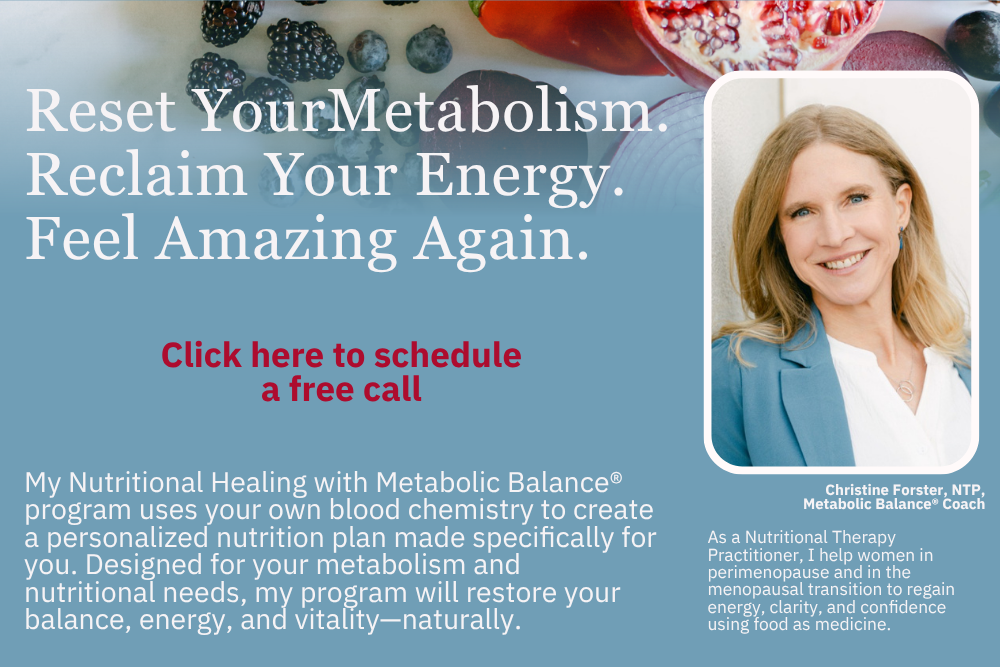Natural Treatment for SIBO in Perimenopause
Oct 27, 2025
A Three Phase Natural Protocol for SIBO
Small Intestinal Bacterial Overgrowth (SIBO) happens when bacteria from the large intestine migrate upward into the small intestine and multiply. SIBO—isn't just an annoying digestive issue. It's a red flag for chronic disease. Left unaddressed, SIBO creates the foundation for cardiovascular problems, liver dysfunction and hypothyroidism which can eventually progress to Crohn's disease and ulcerative colitis.
This post details why perimenopause makes you more vulnerable to SIBO and how to follow a three-stage natural solution that addresses its root causes.
The hallmark signs of SIBO include:
- Bloating, gas, distention, and pain
- Diarrhea or constipation (or alternating between both)
- These symptoms occur within 30 - 60 minutes of eating
Why is SIBO dangerous?
It's not just about discomfort. Too much bacteria hanging out in the small intestine—where bacterial populations should be low—creates three critical problems:
Problem #1: They're stealing your nutrients. Our bodies absorb most of the nutrients in our small intestine. If you have overgrowth, these bacteria eat what you should be absorbing. You're feeding an overgrowth instead of nourishing your cells.
Problem #2: Their byproducts are toxic. Bacterial waste products damage your metabolism, cause inflammation, and break down your gut barrier. Then, once the gut lining is damaged, large molecules of food make their way into the bloodstream. Your body will produce antibodies to deal with these large protein molecules that have no business being there. This is what drives food sensitivities and, eventually, autoimmune disease.
Problem # 3 Inflammation in the gut leads to inflammation everywhere. If your gut is inflamed, so is your brain. Bacterial overgrowth is a stressor to your body, disrupting your brain-gut connection—which is crucial to your well being. This inhibits your digestive juices—and without them, your first line of defense is gone.
Your Body's Natural Defense Lines Against SIBO
Your GI tract has evolved to prevent bacterial overgrowth naturally. There are valves at the top and bottom of the small intestine designed to keep bacteria where they belong. But they depend on adequate digestive secretions to function properly.
Your digestive secretions are your defense lines:
- Stomach acid (HCl) – Antimicrobial powerhouse. Stomach acid not only breaks down food into chyme, it is also meant to kill off bacteria, parasites, and fungi before they reach your intestines. But you have to have the right amount of acidity (technically a pH between 1.5 and 3). This is your first line of defense.
- Pancreatic enzymes – Break down the outer layer of bacteria. As chyme leaves the stomach and enters the small intestine, its acidity is meant to trigger the release of pancreatic juice, secretin, necessary to alkalize it. If the chyme isn't acidic enough (technically a pH below 4), it won't trigger secretin, and over time its acidity will harm your duodenum, breaking the barrier that keeps harmful molecules out of your bloodstream.
- Bile – Breaks down fats and has antimicrobial properties. Bile has several key functions. It further alkalizes your food. It helps the absorption of fat soluble vitamins and the synthesis of hormones. Undigested fats cause loose stools and nasty gas. Bile also stimulates bowel movements..
Why Perimenopause Creates the Perfect Storm for SIBO

When digestive secretions are adequate, bacteria don't stand a chance. When they're inadequate the defense system begins to collapse.
During perimenopause and the menopausal transition, declining estrogen dramatically reduces stomach acid production. This explains why women who never had digestive issues suddenly develop SIBO during perimenopause. Even more troubling, women who already have been experiencing digestive issues see their symptoms worsen during perimenopause. Hormonal shifts have an impact on your digestive function. The same estrogen decline that causes hot flashes and irritability is simultaneously dismantling your gut's protective mechanisms.
Declining acid in your stomach also means that you cannot digest your food properly. What's more, the sphincter at the bottom of your esophagus never gets the signal to close. The result is acid reflux. The solution? Acid blockers. Cringe!
The problem is that when you combine declining stomach acid with acid blockers—Tums, Pepcid, Nexium, Prilosec—you create the perfect storm: since they reduce the acidity in your stomach, you don’t digest food properly, and never absorb enough minerals to make more acid. And the cycle continues.
That is why the habitual use of acid blocker significantly increases the incidence of SIBO. Additionally, hormonal changes slow gut motility, allowing bacteria more time to migrate and multiply. The drop in estrogen also decreases gut microbiome diversity, further disrupting the delicate balance your digestive system needs.
The 3-Phase Solution: Reduce, Support, Repair
We want to reduce bacterial overgrowth, not eradicate it. SIBO is not an infection—it's an overgrowth. If you try to completely eradicate bacteria, you create space for opportunistic or pathogenic bacteria to take root. We want to empower the good guys while bringing the overgrowth back into balance.
Phase 1: Deal with the Overgrowth (30 Days)
- The first step is to work with a nutritional therapy practitioner who can help you reduce the bacterial overgrowth using a natural targeted antimicrobial protocol.
- From the get go, healing SIBO is going to require a lifestyle change. A big part of your work is to create a nutritional plan that ensures adequate intake of protein and healthy fats. These are metabolically regulating and trigger the release of stomach acid, enzymes, and bile.
- It will also be paramount to reduce stress and support rest and digest principles when you eat to encourage good digestion.
What about probiotics? Don't use them as a therapeutic tool in the early phases. There's already an overgrowth problem—adding more bacteria, even beneficial ones, isn't helpful yet. With the exception of two strains: Lactobacillus plantarum and Saccharomyces boulardii, that can be very beneficial in Phase 1.
Phase 2: Support Digestive Juices and Motility
This is where most protocols fail. If you don't address the root cause—deficient digestive juices—SIBO will come back.
Replace what's missing:
- HCl (stomach acid) – Also known as betaine hydrochloride, it supports the missing acid in your stomach, triggering the entire digestive cascade. On top of that, it is microbial—so it strengthens your first line of defense
- Pancreatic enzymes – They break down proteins, fats, and carbohydrates
- Bile support – Alkalinizes your food, breaks down fats, and has antimicrobial properties
Work with a nutritional therapy practitioner to add in the key digestive enzymes. It’s likely that you will need to supplement these in Phase 2 until your body rebalances and makes them on its own.
If you have been taking acid blockers, work with your practitioner to safely reduce and eliminate your dependence on them.
Support motility: Your small intestine has a natural "cleaning wave" called the migrating motor complex (MMC) that sweeps bacteria downward into the colon where they belong. This only happens when you're not eating.
- Eat three balanced meals, five hours apart to give your body a chance to rest, digest, and perform this cleaning sweep
- If you eat too frequently—constant snacking or grazing—you negate this protective mechanism
- Stay active to support gut motility naturally
- Manage chronic stress through deep breathing, meditation, or gentle movement
Constipation considerations: Some people's constipation resolves with fiber, but others need short-chain fatty acids to jumpstart motility. Bowel movements are contractions that require the right synergy of calcium and magnesium. Work with a nutritional therapy practitioner to identify what your body needs.
What about the Low FODMAP diet? FODMAPs is an anti-prebiotic diet designed for IBS, not SIBO. The problem with FODMAPs is that it's all about removing foods—but eventually, we need to bring things back. While it may provide temporary symptom relief for IBS, it's not a solution for SIBO and can further deprive beneficial bacteria of the food they need. SIBO and IBS have some overlaps but they are caused by different drivers.
Phase 3: Address Collateral Damage

By the time you have SIBO, there's almost always collateral damage:
- Nutrient deficiencies – The bacteria have been stealing your nutrients, and damaged villi can't absorb properly. Iron, B12, vitamin D, zinc, and fat-soluble vitamins (A, D, E, K) are commonly deficient in SIBO. Supplement strategically based on testing.
- Leaky gut – Large food molecules crossing into the bloodstream trigger food sensitivities
- Inflammation – Systemic inflammation affects your brain, hormones, and every body system
There is good news: The epithelial cells of the digestive tract can replace themselves very quickly—up to every 24 hours given the right circumstances. Your gut has remarkable regenerative capacity when you give it what it needs.
Nutritional support:
- Get enough protein and healthy fats – These are metabolically regulating and trigger the release of stomach acid, enzymes, and bile
- Eat a variety of plants – Once your gut can tolerate them, diverse fiber feeds beneficial bacteria that produce butyric acid
- Include fermented foods gradually – Sauerkraut, kimchi, kefir, kombucha (introduce slowly)
- Add prebiotic foods when ready – Onions, garlic, leeks, chicory, asparagus, green bananas
Rest and Digest

You need to be in a parasympathetic state—rest and digest mode—when you eat. If you're stressed, rushed, or eating at your desk while answering emails, your body can't produce adequate digestive secretions. Being in a fight or flight state will compromise your gut motility.
Practical strategies:
- Take three deep breaths before meals
- Sit down to eat without distractions
- Chew thoroughly (20-30 times per bite)
- Create a calm eating environment when possible
Do You Need Expensive Testing?
SIBO breath tests don't always give accurate results, and they're expensive. If you have the hallmark symptoms—especially bloating, excessive gas and discomfort right after eating—work with a nutritional therapy practitioner to put you on an antimicrobial protocol for 30 days, followed by a plan to support your digestive secretions, a nutrient-dense diet and lifestyle support to encourage balanced digestion.
We Have No Spare Parts
Human physiology is an extraordinary expression of creative genius. It's a symphony of processes, and every part is necessary and integral to its function. Yet our lifestyle has made it commonplace to have important organs removed. In the U.S., roughly 700,000 gallbladders are removed every year.
I wish I could tell you these organs are expendable. But without a gallbladder, you compromise fat digestion and small intestine function, which increases SIBO risk. And the appendix? We now know it's a nursery for probiotics—a built-in system to repopulate your gut's microbiome when it gets wiped out by antibiotics, glyphosate from pesticides, or any of the myriad reasons our flora become imbalanced in contemporary life.
Get Support
SIBO during perimenopause isn't a life sentence. It's a sign that your body's protective mechanisms need support during a major hormonal transition.
The three-phase approach—reduce overgrowth, support digestive secretions, and repair collateral damage—addresses root causes instead of just managing symptoms.
Your digestive tract has remarkable regenerative capacity. Epithelial cells can replace themselves every 24 hours under the right conditions. The key is giving your body what it needs: proper digestive secretions, adequate motility, nutrient-dense food, time between meals to perform its natural cleaning function and stress management tools.
You don't have to accept bloating, pain, and irregular bowels as inevitable parts of perimenopause. Your body is not a collection of spare parts—every organ matters. Your digestive system will nurture you through the hormonal changes of perimenopause when given proper support.
If SIBO concerns you, personalized nutrition and lifestyle support can make all the difference. As a Nutritional Therapy Practitioner, I design customized protocols to rebalance digestion, ensure vitality with a nutrient dense diet, and support through perimenopause and the menopausal transition with ease.
I will guide you back to metabolic health during perimenopause and the menopausal transition with nutritional healing and sustainable lifestyle strategies
Let's Connect
Get my email newsletter with health and wellness tips and information about how to work with me.


